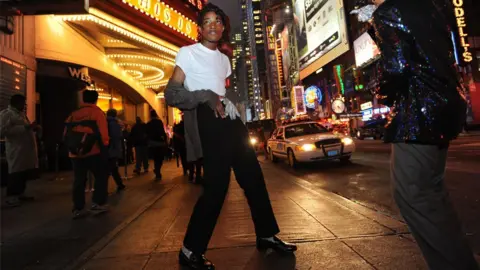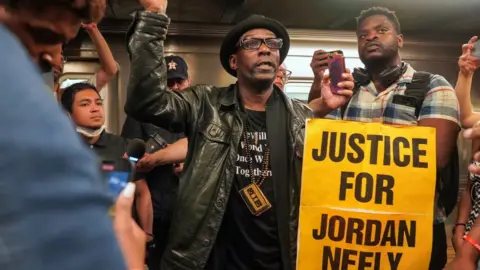Jordan Neely: What happened in NYC subway chokehold case?
 Tribune Content Agency LLC / Alamy
Tribune Content Agency LLC / Alamy A New York subway rider has pleaded not guilty to manslaughter and negligent homicide charges after he applied a fatal chokehold to restrain another passenger.
Jordan Neely, a 30-year old homeless man, was declared dead after a struggle with other passengers on 1 May.
Daniel Penny, a 24-year-old ex-Marine who was filmed by an onlooker as he restrained Mr Neely, faces up to 15 years in prison if convicted.
What happened in the fatal encounter?
It took place on a Monday afternoon on a northbound F train in Manhattan.
Witnesses said Mr Neely had been shouting at other passengers and asking for money. There is no evidence he had attacked any of them.
Bystander video shows Mr Penny with his arms around Mr Neely's neck for about two minutes and 55 seconds.
Two other passengers are also seen restraining Mr Neely by the arms.
After two minutes, another passenger warns Mr Penny and the other men that Mr Neely might be dying.
 Getty Images
Getty ImagesOne of the men replies that Mr Penny has stopped "squeezing" Mr Neely's neck.
The onlooker says Mr Neely has defecated on himself, and this could be a sign he is dying.
He warns Mr Penny that if he does not let Mr Neely go, he could face a murder charge.
After Mr Penny rises to his feet, another passenger tells him: "That was one hell of a chokehold, man."
Police told CBS News, the BBC's US partner, that Mr Penny had told other passengers to call emergency services during the struggle.
Video shows him putting Mr Neely into a recovery position after he goes limp.
Juan Alberto Vazquez, a freelance journalist who filmed the encounter, told the New York Times that Mr Neely had been screaming that he had nothing to eat or drink.
"I don't mind going to jail and getting life in prison. I'm ready to die," he reportedly said.
Mr Vazquez said that he did not believe the man would die.
"None of us were thinking that," he told the New York Times. "He was moving and he was defending himself."
Who was Jordan Neely?
Jordan Neely was a Michael Jackson impersonator who frequently performed in New York's Times Square.
He had 42 previous arrests on charges such as evading fares, theft and assaults on three women, according to US media.
He had pleaded guilty to assaulting a 67-year-old woman leaving a subway station in 2021.
His mother, Christie Neely, was strangled to death in 2007 by her boyfriend, who was sentenced to 30 years in prison in 2012.
Following his mother's death, Mr Neely began experiencing mental health issues, according to family members.
"Jordan deserves justice. He was loved," his aunt Carolyn Neely told the BBC.
Dante Mills, a lawyer for the Neely family, has accused Mr Penny of acting as a vigilante. The attorney said Mr Neely never harmed any passengers on the day he was killed.
"He had demons. He went through tragedy at a very young age," Mr Mills said.
Who is Daniel Penny?
Daniel Penny is from Long Island and had previously served in the US Marines.
In a statement on social media in early June, Mr Penny said that he did not intend to kill Mr Neely.
 Getty Images
Getty Images"I was scared for myself but I looked around there were women and children, he was yelling in their faces saying these threats. I just couldn't sit still," he said.
According to NBC News, he graduated from high school in 2016 and was most recently living in the New York City borough of Queens.
Mr Penny rose to the rank of sergeant in the Marine Corps and was honourably discharged after four years in June 2021. His lawyers say he is studying architecture at university.
He has pleaded not guilty to the charges.
Mr Penny's supporters have raised nearly $3m (£2.4m) for his legal defence.
What are the charges?
Second-degree manslaughter charges are filed when a person "recklessly causes the death of another person", according to New York's criminal code.
In New York state, the jury must find the defendant engaged in reckless conduct creating an unjustifiable risk of death, and then consciously disregarded that risk.
The defendant's actions must also be a gross deviation from how a reasonable person would have acted in a similar situation.
The second charge, criminally negligent homicide, applies when a suspect is believed to have failed to perceive that a particular action would carry a substantial risk of death.
In New York, it is a class E felony - the lowest felony charge available - and is punishable by up to four years in prison.
 Getty Images
Getty ImagesWhat are the chances of a conviction?
Manhattan prosecutor Alvin Bragg is confident enough that he can win a conviction that he opted to file charges directly, rather than punting the controversial decision to a grand jury, which can be used to determine whether there is enough evidence to pursue a prosecution.
There has been a growing awareness of the danger of chokeholds after the 2014 death of Eric Garner, an unarmed man from New York City restrained by the neck by police.
And after the death of George Floyd in 2020, New York legislators increased penalties for officers who use chokeholds during arrest.
But Jeffrey Lichtman, a New York defence attorney who has previously represented drug lord El Chapo and accused mobster John Gotti Jr, says prosecutors will fail to win their case against Daniel Penny because the state must prove that the accused knew his actions could kill.
Mr Penny, he says, was selflessly risking his life to protect fellow passengers, and witnesses have said they did not expect the tussle on the subway floor to end in death.
"It's not like he snuck up behind him and hit him over the head with a brick or a bat," he says, adding that at any point Mr Neely could have submitted and ended the struggle.
Any New Yorker, including members of a future jury, will have had several encounters with mental illness on the subway.
Most jurors, he says, would prefer that an ex-Marine such as Mr Penny step in to prevent a person on the subway from turning violent.
"If litigated properly this is a slam dunk acquittal," he says, calling Mr Penny a "sympathetic defendant".
